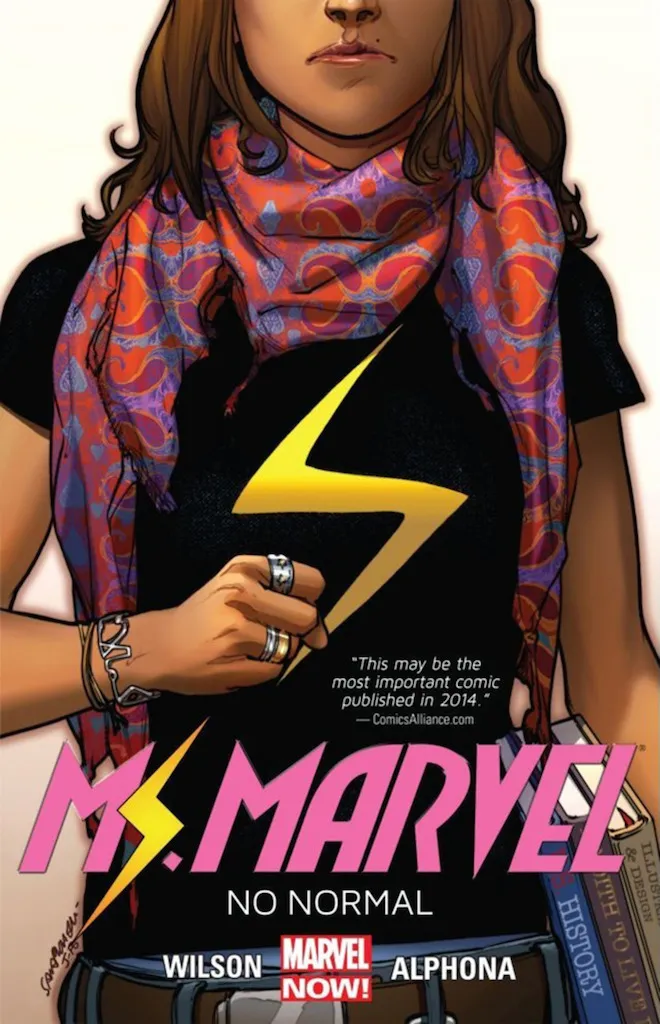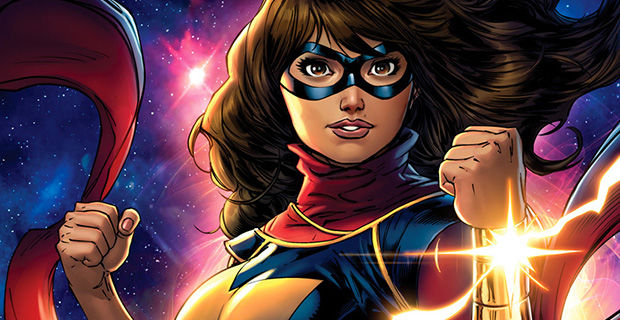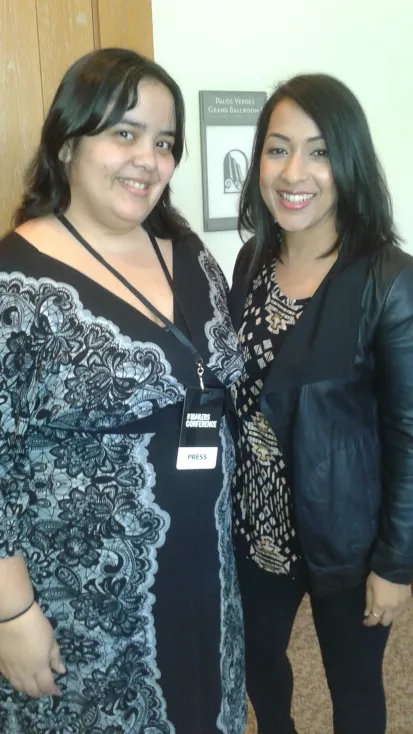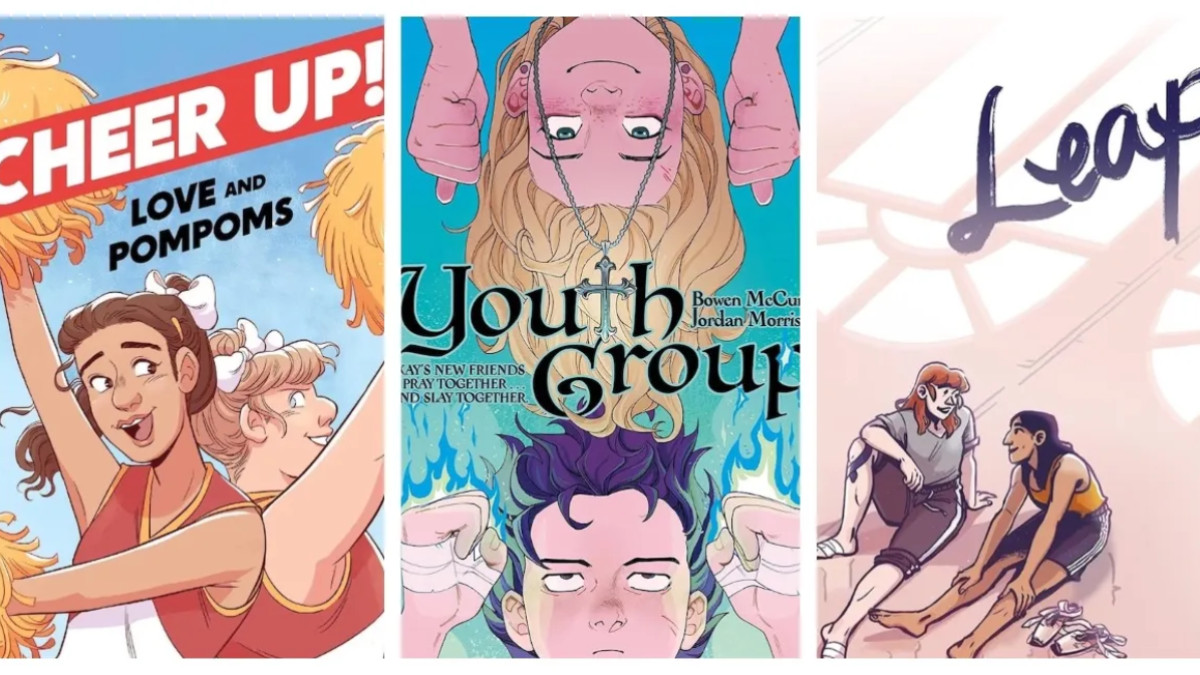One of the female powerhouses invited to do a Q&A at The 2016 MAKERS Conference this year was Marvel’s Director of Content Development (and co-creator of TMS favorite, Ms. Marvel!) Sana Amanat, who discussed the importance of representation in a visual medium. You can check out her presentation HERE.
Afterwards, I had the chance to have an in-depth chat with Amanat exclusively for TMS, wherein we talked about Ms. Marvel, how diversity and representation can be done well, and why “Marvel is more ‘indie’ now than it ever has been” before.
Teresa Jusino (TMS): In your Q&A, you talked about superheroes being our gods and goddesses, and that one of the things people love about heroes is that they are willing to sacrifice for others. As women, we’re asked to sacrifice all the time in a way that men aren’t often asked to. When telling female superhero stories, how do you balance the expectation that women sacrifice vs. what a superhero is supposed to do?
Sana Amanat: We try not to define it by whether it’s a man doing the sacrificing or a woman doing the sacrifice. We have to look at what the conflict is and what the story’s all about and what the message is more than anything else. I think it becomes problematic when men are sacrificing women. I think, when you take the agency out of it, then it becomes a different kind of story, but when a woman makes a choice, when an individual makes a choice of their own volition, that they have to do something because they believe in it, I think that’s so much more powerful, and that’s more of an interesting story to tell.
If I have a child, or my nephew or my niece, I know that I would probably sacrifice myself for them because I love them so much, and because I believe in the greater idea that they have a future, and that they need to be saved, and I think that’s really what superhero stories are all about. Understanding what that kind of sacrifice means for the greater good, and for humanity at large. That’s fundamentally why you become a hero. So, when you’re talking about “man” or “woman,” I think the unifying factor in being a hero and being a powerful character, is that the ideals are all the same. That the mission statement is all the same. And that’s when you get to the place where it doesn’t matter if it’s a female character or a male character. You have to start looking at the message behind what their mission needs to be.
I don’t worry so much about that, because we have such fantastic characters who have a very strong sense of agency, who are empowered in their own right, and who fundamentally fight for what they believe in and the legacy they’re holding onto. There was that great moment in Ms. Marvel when she realized she could take on the mantle of Ms. Marvel, not because Carol Danvers had it, but because of what that mantle stood for. So, that’s what it’s all about for me, the meaning behind the type of hero you want to be.
Because if you worry so much about Okay, this is a female character/a male character/a gay character/a black character, and they cannot do certain things because of that, then you’re only telling a one-dimensional story. You are not telling a story that is layered and has different messages and meanings behind it – like real individuals.
TMS: Getting into the industry of comics for a minute – it’s easy to be negative about issues of representation and all of that, but what is great about being a woman in comics right now, for you?
Amanat: It’s really exciting to see the change happening in front of your eyes. Kelly Sue [DeConnick] says this a lot: women have always been reading comics. The difference is, something happened along the way where we began to be excluded. It was out of people believing that this was a territorial thing where only boys could read it, and only boys could understand superhero comics in particular. But to see – when I started out seven years ago – to see that we had zero female titles, and now we’re at a point where we have twenty, and that evolution and that conversation to be a part of it and to also watch it, is extremely satisfying and gratifying for me. So rarely in life do you get to actually witness change happening in front of you.
You have “signal change” moments where, like, Barack Obama was elected, or…not to compare this to the Presidency. [laughs] You know, comics are important…
But when you see that manifest, when you physically see…like, our Women of Marvel panels when there was room was half this size [Ed. Note: we were in a huge lobby area outside one of the ballrooms at the Terranea Resort in CA] and only a quarter filled, and now you have a room as big as this hallway, and it’s packed, and people are excited, and energized, and proud to be fans – that’s incredible to me. I don’t know if people were afraid before, or if they’re just getting into comics. I’m not sure why, and I don’t really care why, I’m just excited about the fact that they’re showing up. That’s a sight to see. The fact that you see boys and men showing up to the Women of Marvel panels as well kind of goes to show that they are understanding and on-board with the mission.
TMS: Going back to Marvel comics and stories – in the Q&A you mentioned that there are other Muslim characters in Marvel, and I thought of Faiza in Captain Britain. Obviously it’s a British story, so it’s different, but it’s also a white guy writing a Muslim female character. I’ve actually spoken to Paul Cornell, who was working on the title, and he made sure to speak with as many Muslim women as he could to make sure to get it right. There’s an Opportunity vs. Representation question – and I think they’re both important, so I’m not going to ask you Which is more important, that people of color have jobs, or that they’re seen in the media they consume? But how can creators who are not of color broaden their storytelling in that way? Because they need to participate in creating those characters if change is going to happen.
Amanat: Yeah, and I think they are. Just seeing what’s been going on at Marvel in the past few years – like, you have Jason Aaron writing Jane Foster as Thor. Brian Bendis writing Miles Morales as Spider-Man. When you’re a very good writer, you know how to write experiences that are different from your own, that are distinct, and that’s fundamentally what it means to be a good writer. It doesn’t matter if you’re white, black, brown, whatever – you need to know how to get into what makes a character a character; what makes them interesting and relatable.
I think a lot of writers get wrapped up in the idea of Well, I’m not black, how can I tell a story about a black person? I think we need to step back and say How do you write the story of this character who used to live in Brooklyn, then he moved to Queens, and then he won the stock market…. That’s the story you’re telling. And who his parents are, and what values were passed down by his parents.
We have to strip away those labels – that’s something I love to say – strip away the labels, so that you can get to the nitty-gritty of who that character is, and then you tell a good story.
This is not to say….you know, do the research. Talk to people. But you’re writing about a person who happens to be black. And listen, being black, being a woman, being a Muslim paints your experiences in very, very different ways. But that’s the painting, right? That’s the lens by which you tell a particular story, and colors the way [the character] makes a decision, or colors the way he or she views authority. Those are the different nuances that start adding layers to who these characters are.
TMS: Since Ms. Marvel is primarily a book about teenagers – and is written by adults – how do you keep tapped into what the kids are doing these days?
Amanat: I believe Willow [Wilson, writer for Ms. Marvel] is a teenager in a 30-year-old woman’s body. She’s very tapped into the Millennial Conversation. But I think there are a lot of fundamental ideas that, whether you were a teenager in the sixties, or whether you’re a teenager now, that you think you know who you are, but that’s probably not who you actually are. That you’re so influenced by your surroundings and get frustrated by your parents. I think those are really simple ideas that we’ve amplified in a lot of ways, and amplified though [Kamala’s] very conservative parents, and her relationship with Bruno and not quite figuring out what that is…I think teen stories haven’t changed, in that classic sense, for years.
I read young adult novels, because there’s still a teenager living inside of me!
TMS: Obviously Kamala Khan is a very heroic character, but the book also has teenagers sometimes getting up to no good. In a comic that appeals to younger kids, how do you navigate being “age-appropriate?”
Amanat: Well, we’re very cognizant of the fact that some young girls or boys are reading this, so we try to walk the line between being edgy and relevant and also not talking about things that we don’t even really believe in. Like, Kamala Khan is not a violent person. She doesn’t like punching bad guys, she doesn’t like needing to resort to being physically rough with people, because that’s going to get them into their place. That’s why the way that the actual fight scenes are choreographed – it’s meant to be a little bit fun, and quirky, and awkward at times. We don’t like to make gun references.
We still also want to make sure that we’re not just PG-ing it up or sanitize it too much. We have conversations about how far we can push it, and then how to sort of pull back when we need to. And I’ve had parents tell me I love reading this with my kids, and if there’s anything that I’m uncomfortable with, I just skip over it. Works for me.
TMS: I also love indie titles, and I know that Marvel has had other imprints in the past. Has there been any talk that you’ve been a part of about bringing a more indie line back for the smaller, non-superhero stories?
Amanat: You know, I think we’ve talked about it. The reason I would say we’re not going to do it is that I don’t think we need to anymore. I think that each of our characters and our series lines have a distinct quality to them. Like, a Captain America series is so different from a Spider-Man series is so different from Ms. Marvel, or Squirrel Girl. The fact that Squirrel Girl and Wolverine can live in the same universe…and it’s totally fine!
I think we have to give our readers more credit in that they think it’s okay for us to experiment with genre within the larger Marvel landscape. Superheroes are not a “genre.” We have genres within the superhero world. I think we’re in a good place where we don’t have to separate those indie stories. Ms. Marvel is a small story. She happens to be an Avenger now, but we always come back to tell small, grounded stories in the Ms. Marvel world, so that new readers aren’t overwhelmed and they always know what our series is about.
I think we’re more “indie” now than we ever have been before, but we’re telling essentially the same stories.
—Please make note of The Mary Sue’s general comment policy.—
Do you follow The Mary Sue on Twitter, Facebook, Tumblr, Pinterest, & Google +?











Published: Feb 4, 2016 06:03 pm